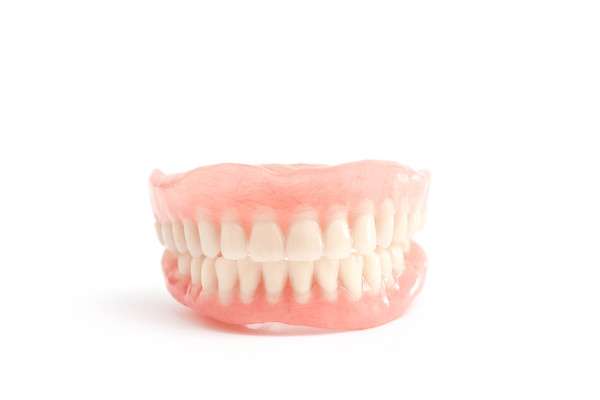 If a denture patient is experiencing sore gums, a denture relining may offer a better fit and more confidence. Dentures can have definite advantages, but only when they fit properly, allowing chewing and speech to be as normal as possible. Relining can help make this possible.
If a denture patient is experiencing sore gums, a denture relining may offer a better fit and more confidence. Dentures can have definite advantages, but only when they fit properly, allowing chewing and speech to be as normal as possible. Relining can help make this possible.
Know the types of denture relining
There are three main types of relines, each with its own benefits and disadvantages. A patient should become familiar with these terms as they can make a difference when deciding on use.
Temporary relining
When a patient has had ill-fitting dentures for a long period, causing soreness or an infection in the gums, the denture is lined with a soft, medicated material that helps the gums heal. Once healed, relining can be completed. If a temporary reline does not work, it is possible a new denture needs to be made.
Hard relining
This process entails lining the denture with material and fitting it to the patient. It then sets up to a firm, rubbery texture and subsequently replaced with acrylic, making the denture fit perfectly around all the curves of the gums. A hard reline can last for up to two years.
Soft relining
A soft reline can help compensate for uncomfortable rubbing by using a pliable material that can stay soft for a year or so, cushioning sore spots. If constant soft relining is needed, it is possible that the denture may need to be remade. The soft reline can last well beyond two years.
5 things to consider when making your choice
Armed with information regarding the types of relines available is a good start. Each person’s mouth and circumstances differ, however, changing the type needed. There are a few things a patient should consider prior to making that choice.
1. Why are relines needed?
A reline is necessary from time to time as the jaw changes. Shifting or shrinkage of the bones, gums or tissues are the main causes of needing an adjustment.
2. Does the denture have to go to the lab to be relined?
For a hard reline, the dentist sends an impression of the patient’s gums to the lab, where a permanent liner will be made. Once prepared, they will need to have the denture to place the reline. The process may take a day or two.
3. Can the dentist reline a denture in the office?
Both the temporary and the soft reline may be completed chairside, usually on the same day as a dental visit. The cost is less than a lab reline.
4. Can a patient reline the denture?
Do-it-yourself relining material can be purchased. The results are often uncomfortable and very temporary.
5. Can only a portion of the denture be relined?
It is not necessary to have the full denture relined. A dentist can discover where the problem lies and address just that section of the denture.
Check out what others are saying about our dental services on Yelp: Denture Relining in San Antonio, TX.
Conclusion
Dentures are a good solution for those who no longer enjoy healthy, natural teeth, but a good fit is essential. Denture relining can offer more comfort and a more secure fit.
Request an appointment or call Evans Family Dentistry at 210-503-7043 for an appointment in our San Antonio office.
Related Posts
Finding a reputable kid-friendly dentist for children is important. Parents can ensure they find the right dentist by planning properly and following useful tips such as considering references, scheduling a consultation, and understanding what oral care needs exist.The experience that children have with dentists can have a lasting impact. To minimize the risk of a…
Teeth whitening appeals to everyone with a dull smile, including those with sensitive teeth. While it remains a viable stain-lifting option, sensitivity-prone patients should approach treatment with caution to avoid irritation while still improving smile brightness. Custom take-home trays from a general dentist help control dosage and fit, reducing many common triggers of sensitivity.The teeth…
Dental emergencies can occur without warning, causing intense discomfort and requiring swift care from a qualified emergency dentist. Being prepared can alleviate anxiety and improve the effectiveness of the dental treatment. Here are 10 detailed steps to handle dental emergencies efficiently and calmly.Before rushing to an emergency dentist, it is essential to assess the severity…
